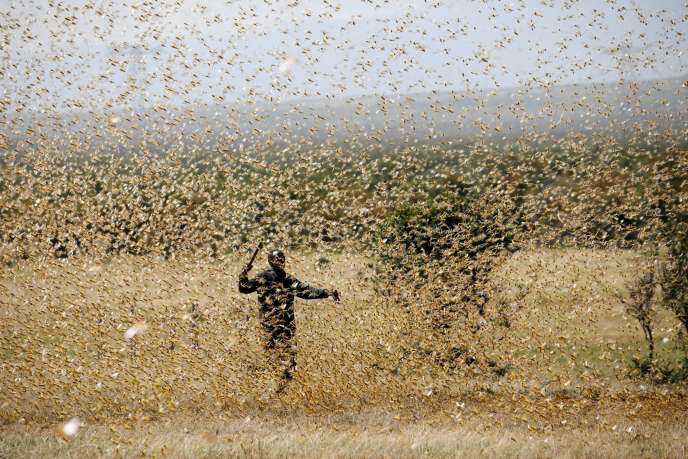LOCUST ALERT
The presence of swarms and groups of mating and egg-laying Desert Locust adults over large areas, mainly between Trarza and Adrar, and to a lesser extent in Inchiri and H. Chargui, has been reported in Mauritania. Chargui have been reported in Mauritania (Fig.1).
This resurgence phase, i.e. the reappearance of the Desert Locust, could lead to a recrudescence if it is not quickly brought under control. This situation is the result of a sudden increase in locust densities in the summer breeding areas of southern Mauritania
in southern Mauritania, leading to the formation of groups of adults from mid-September onwards. Hatchings have been observed and it is likely that a resurgence will develop over the coming weeks, with the possible formation of small hopper bands and swarms. As of October 10, over 4,200 ha had been treated by ground.
The infestations arriving in western Mauritania are the result of summer breeding in the south, where well-distributed rains have fallen in recent months, causing vegetation to turn green much further north than normal (fig 2). In addition, breeding certainly took place in northern Mali, but neither its extent nor its importance could be confirmed by surveys due to insecurity.
In Niger, locust numbers have recently increased in the Tamesna plains and along the western slopes of the Aïr mountains, where at least one group of immature adults has formed. In Chad, locusts are concentrated in the north-east, where a small group of hoppers has been reported. As vegetation dries out in these areas, groups of adults and a few other small swarms are likely to move northwest into Mauritania and breed in areas of recent rainfall, extending as far south as Morocco. As a result, groups of larvae and adults, as well as bands of larvae and small swarms, can be expected to form over the next three months. Survey and treatment operations must be continued and intensified over the coming weeks, hence the need to support frontline countries (Mauritania, Mali, Niger and Chad), particularly Mauritania, in their efforts to combat the locust. This alert on the desert locust had been launched by the CILSS through the opinion resulting from the Concertation technique régionale sur les perspectives agricoles et alimentaires au Sahel et en Afrique de l'Ouest (PREGEC), held from September 19 to 21, 2016 in Lomé, Togo, and also by the Commission de Lutte contre le locquet pèlerin dans la région occidentale (CLCPRO) and by the FAO.
For more information on this situation, consult the special Desert Locust bulletin, online at: www.agrhymet.ne



SALUT
test